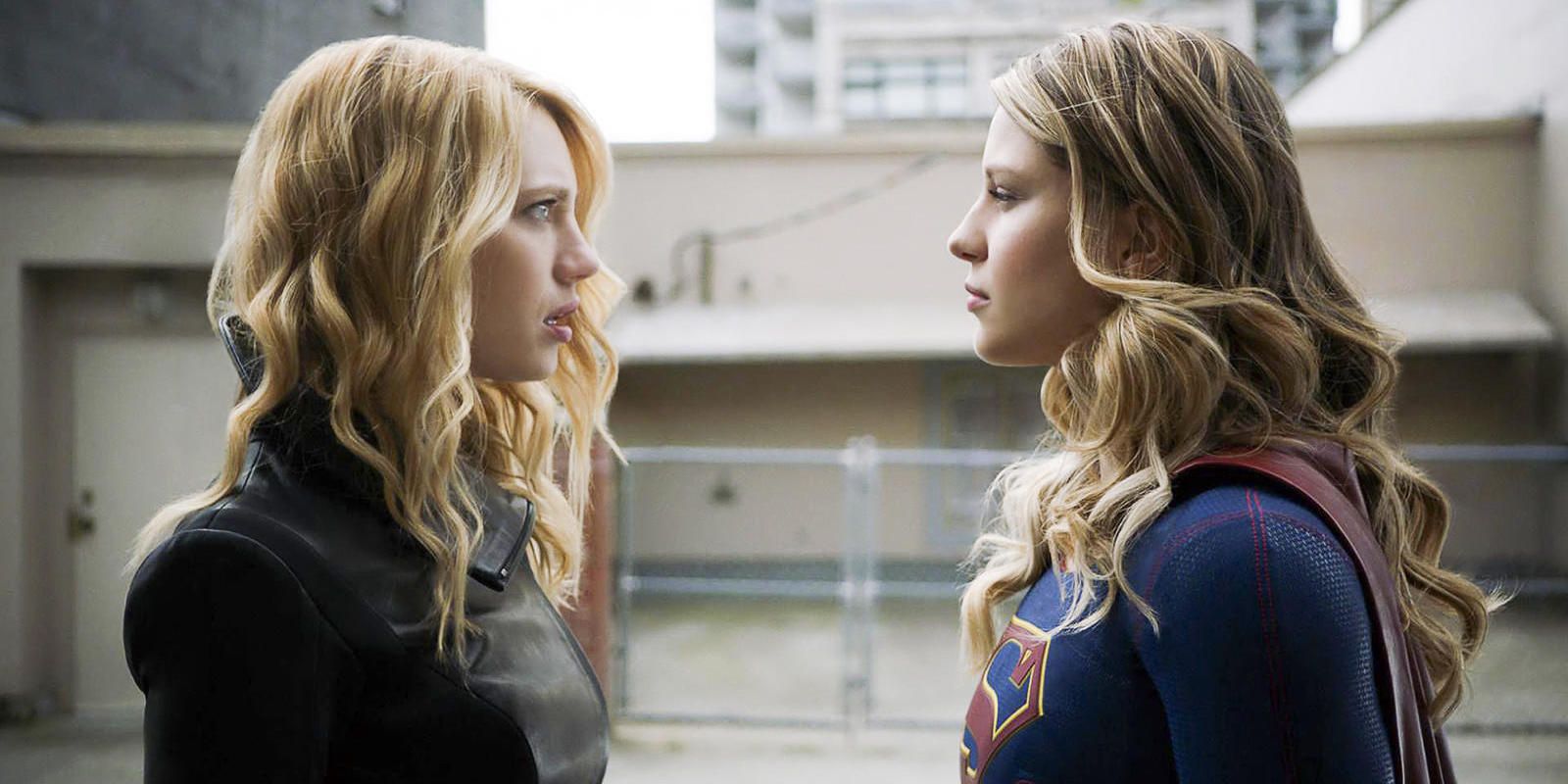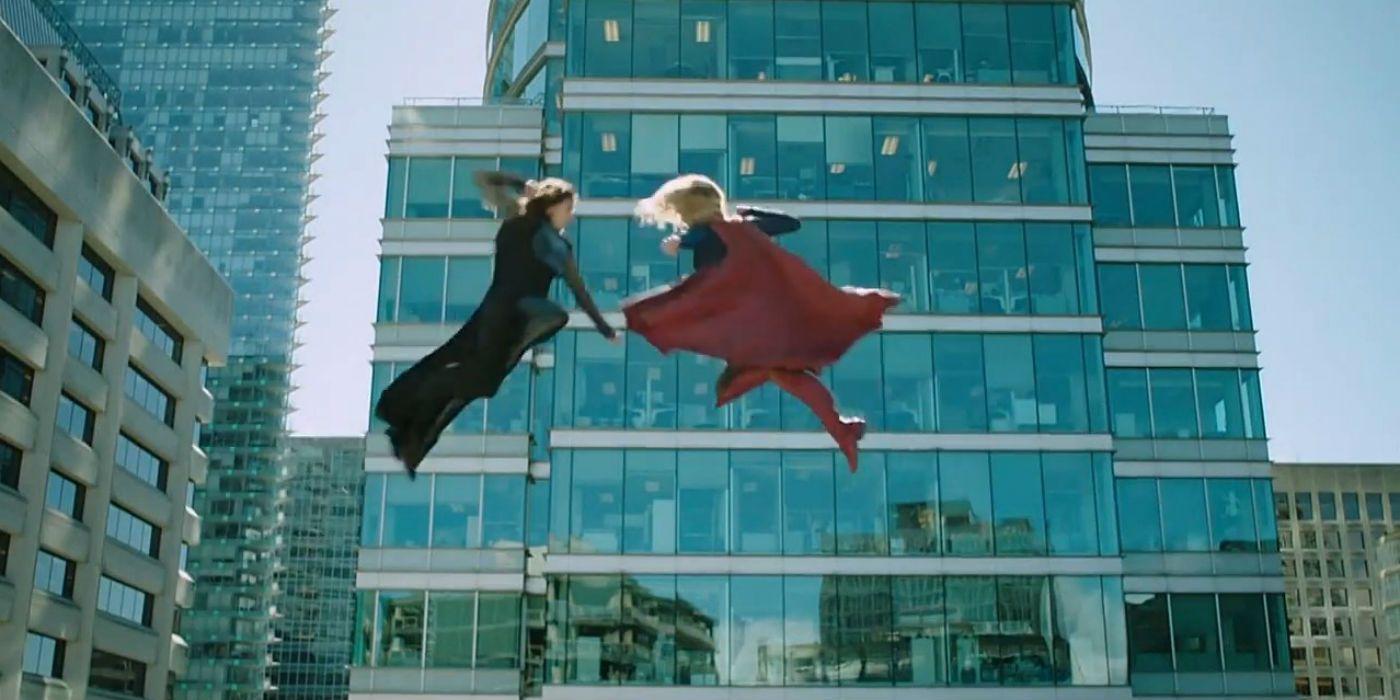If the go-to formula for titling Supergirl episodes is (as it seems to be) "Politically-Charged Topical Phrase + Vaguely-Related Superhero Action Premise," season 3's second episode typifies the form. Despite the potentially provocative title (this is, after all, the series that named last season's alien-brawl finale after a catchphrase connected to Elizabeth Warren and Chelsea Clinton), "Triggers" is less about being set off by words/topics/situations than it is about the threat of the supervillain Psi - a powerful psychic who draws out and manipulates the worst fears of her targets in order to commit crimes. That this is an alarming new situation for everyone involved, at least, confirms that Dr. Jonathan "Scarecrow" Crane doesn't seem to be in business on Earth-38.
Psi functions less as a threat in her own right (her rote origin story gets handled via exposition, and her evil plan begins and ends at "rob various banks") than as instigator for the episodes' two main story threads. In the main plot, facing fear-hallucinations nudges Kara over the next post-Mon-El speedbump (she's secretly worried he died on his way out of Earth's solar system); while in the arc-building B-story, single mom Samantha (believed to be season 3 Big-Bad "Reign", as teased at the end of season 2) gets pulled into the action when daughter Ruby knowingly endangers her life in an attempt to force mom into admitting that her surprise show of strength last episode wasn't adrenaline but genuine super-powers.
Supergirl definitely seems to love its female villains. Both prior seasons built up to final battles with powerful extraterrestrial matriarchs in addition to featuring a mix of well-known and obscure DC "bad girls" - including Livewire, Indigo and Scorcher. "Triggers" adds Psi to the checklist, and also continues the build-up for promise season 3 super-threat Reign, who still appears to be on the side of the angels here but has been framed as destined to cause problems in the future.
The desire to put female villains in the foreground is, of course, a sensible subset of Supergirl's feminist-tinged "mission" as a series. The show uses the obvious symbolic statement that the title character has always represented, simply by "existing" as a young woman wearing the shield and colors of the world's most famous superhero, to put women and female-centered storylines at the forefront of its concerns. Earth-38 has a female U.S. President (former Wonder Woman Lynda Carter), Calista Flockhart's lady media mogul Cat Grant is Supergirl's mentor and a recurring character, and season 2 prominently focused on Kara's sister Alex coming out as a lesbian and her own close friendship with female industrialist Lena Luthor. So it makes sense that, where possible, the de facto First Lady of the DC TV Universe is also used to highlight the female villains in DC's comic book canon. But, in a development that would seem to define the notion of "irony" in such cases... is there a prospect that they'll use that limited resource up too fast?
That's not to say that DC is in any way lacking in female villains - although it's worth noting that more than a few of the better known prospects "belong" to other heroes and/or properties that the CW projects may be "discouraged" from poaching around. Poison Ivy, Catwoman and Harley Quinn are likely spoken for across the various Batman incarnations, while Giganta and Cheetah are plausibly waiting in the wings for a Wonder Woman sequel at some point. Two-time nemesis Livewire was already borrowed from cousin Superman.
The other prospects are certainly out there, and there's certainly nothing stopping Supergirl's writers from gender-flipping male villains or inventing new ones from whole cloth. But the seeming plausibility of either option highlights what has become one of the surprising strengths of a series that has maintained its status as the most "different" of the so-called Arrowverse-adjacent DC TV properties: A superhero series where the personal stakes generally outweigh the villainous ones, in terms of what keeps its loyal viewers coming back from week to week. While it has varied from arc to arc, Supergirl fans tend to be more invested in Alex and Maggie's evolving romance, or Kara's complicated friendships with Lena Luthor and James Olsen, than with who's getting punched across National City that week.
In some ways, that's a riskier prospect than the alternative; given that a more action-centric series can often rebound with the arrival of a new villain or ally that connects especially well with fans (see: Agents of S.H.I.E.L.D. getting its more positive notices for season 2's Inhuman-reveal storyline and season 4's Ghost Rider/LMD multistory arc). But in a superhero TV landscape dominated by villain-of-the-week oriented storylines, allowing interpersonal drama to be part of Supergirl's core appeal has given the show a unique flourish. Perhaps, instead of burning through female villains like Psi, Supergirl could give them a bit more time to shine.


